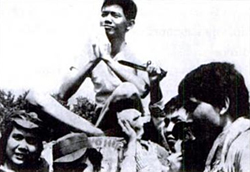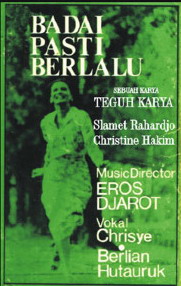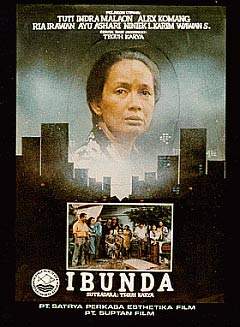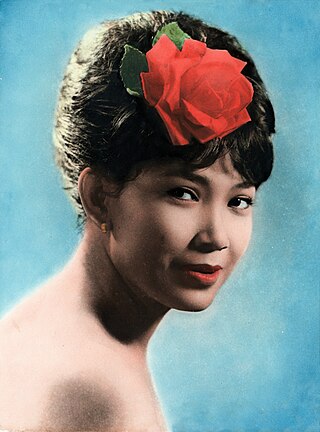Related Research Articles

Soe Hok Gie was a Chinese Indonesian activist who opposed the successive dictatorships of Presidents Sukarno and Suharto.

Badai Pasti Berlalu is a 1977 Indonesian film based on the novel of the same name by Marga T. It was directed by Teguh Karya and starred Christine Hakim, Roy Marten and Slamet Rahardjo.

Teguh Karya was an Indonesian film director. Starting his entertainment career in theatre, he made his directorial debut in 1971 with Wadjah Seorang Laki-Laki in which he also wrote the screenplay. He later directed numerous critically acclaimed films, including Cinta Pertama, Badai Pasti Berlalu, and November 1828. In 2001, Karya died from complications from a 1998 stroke.

November 1828 is a 1979 Indonesian historical drama directed by Teguh Karya. Production cost an estimated Rp 240 million, making it the most expensive Indonesian movie up to that point. It tells the story of a village struggling against the Dutch colonial military during the Java War, and touches on the themes of nationalism and cultural identity. The movie won 6 Citra Awards.

Cinta Pertama is a 1973 Indonesian romance film directed by Teguh Karya. Starring Christine Hakim, Slamet Rahardjo, and N. Riantiarno, it tells the story of Ade, a young woman who falls in love with Bastian, an ex-convict, yet is engaged to Johny, who raped Bastian's wife and caused her to be killed in the resulting fight. It was well-received both critically and commercially, garnering five Citra Awards and launching Christine Hakim's career. Tabloid Bintang has listed it as the 19th best Indonesian film of all time.
Di Balik Kelambu is a 1983 Indonesian film directed by Teguh Karya. It stars Christine Hakim and Slamet Rahardjo.

Slamet Rahardjo Djarot is an Indonesian actor, director, and screenwriter of Javanese-Bantenese descent. He is the elder brother of director, songwriter, and politician, Eros Djarot. Since his directorial debut in 1979 with Rembulan dan Matahari, he has directed and/or written twelve films; one of which, Langitku, Rumahku, was Indonesia's submission to the 63rd Academy Awards in 1991.

Hajjah Laila Sari was an Indonesian comedian and singer of rock and children's songs. She has been nicknamed the "energetic old lady" for her on-stage persona.
Ahmad Salim, better known by his birth name Wim Umboh but also known by the Chinese name Liem Yan Yung, was an Indonesian director who is best known for his melodramatic romances.

Roy Wicaksono Abdul Salam, better known by his stage name Roy Marten, is an Indonesian actor.

Ibunda (Mother) is a 1986 Indonesian film directed by Teguh Karya. Telling of a family's struggles in Jakarta, it set a new record at the 1986 Indonesian Film Festival when it won nine Citra Awards.
Tuti Indra Malaon, born Pudjiastuti Suratno, was an Indonesian actress, dancer, and lecturer.

Djadoeg Djajakusuma was an Indonesian film director and promoter of traditional art forms. Born to a nobleman and his wife in Temanggung, Central Java, Djajakusuma became interested in the arts at a young age, choosing to pursue a career in theatre. During the Japanese occupation from 1943 to 1945 he was a translator and actor, and in the four-year national revolution which followed he worked for the military's educational division, several news agencies, and in drama.

Ponirah Terpidana is a 1984 Indonesian drama film directed by Slamet Rahardjo. Starring Nani Vidia, Rahardjo, and Ray Sahetapy, it follows a young woman named Ponirah who becomes a prostitute and is arrested for the murder of a rich businessman. The film, which combined traditional and contemporary elements, was a critical success in Indonesia. It won three Citra Awards at the 1984 Indonesian Film Festival, from a total of eleven nominations.
Herwin Novianto is an Indonesian film director who won the Citra Award for Best Director at the 2012 Indonesian Film Festival for his drama Tanah Surga... Katanya . He later directed Aisyah, biarkan kami bersaudara in 2016 which starred Laudya Cynthia Bella.

Mieke Wijaya was an Indonesian actress, model, and politician who won three Citra Awards. She was crowned the best female antagonist in Indonesian film industry along with Suzzanna and Ruth Pelupessy. Wijaya began her career as a teenager and soared to popularity by partaking a role in Usmar Ismail's commercially successful Tiga Dara, her name became increasingly popular after starring in the soap opera Losmen in 1987.

Niniek L. Karim is an Indonesian actress who has won two Citra Awards for Best Supporting Actress.

Anastasya Soerip was an Indonesian singer and actress.

Teater Populer is an Indonesian theater company founded in 1968 by Teguh Karya and members of the Akademi Teater Nasional Indonesia (ATNI). Many famous Indonesian actors have worked for the company.

Marjolein Tambayong, better known by her stage name Rima Melati or by her nickname Lientje, was an Indonesian actress, model, and singer. She appeared in close to one hundred feature films, including works by Wim Umboh, Sjumandjaja, and Teguh Karya. She received multiple awards, including a PWI Award for Best Actress for Noda Tak Berampun, a Citra Award for Best Leading Actress for Intan Berduri, and five nominations for the Citra Award for Best Supporting Actress.
References
- Footnotes
- Bibliography
- Irwansyah, Ade (23 April 2010). "25 film Indonesia Terbaik Sepanjang Masa" [25 Best Indonesian Movies of All Time]. Tabloid Bintang (in Indonesian). Archived from the original on 24 March 2012. Retrieved 19 August 2011.
- Mardiyati, Ade (23 July 2010). "A Flower in The Eve of Her Bloom". Jakarta Globe. Archived from the original on 5 January 2013. Retrieved 5 February 2012.
- "Slamet Raharjo". Encyclopedia of Jakarta (in Indonesian). Jakarta: Jakarta City Government. Archived from the original on 15 June 2012. Retrieved 4 February 2012.
- "Teguh dan apik dalam karyanya" [Teguh and doing well in his work]. Tempo (in Indonesian). 11 June 1983. Archived from the original on 3 March 2016. Retrieved 27 April 2012.
- "Teguh dan karyanya" [Teguh and his work]. Tempo (in Indonesian). 13 May 1972. Archived from the original on 4 March 2016. Retrieved 27 April 2012.
- "Wadjah Seorang Laki-laki – Ballad of a Young Man". Monash University. 3 August 2007. Archived from the original on 8 September 2008. Retrieved 27 April 2012.
- "Wajah Teguh Karya dalam Film Pertamanya" [Teguh Karya's Face in His First Film]. Kompas (in Indonesian). 20 September 1996.
- "Wajah Dua Orang Laki-Laki" [The Faces of Two Men]. Tempo (in Indonesian). 10 May 1975. Archived from the original on 4 March 2016. Retrieved 4 February 2012.